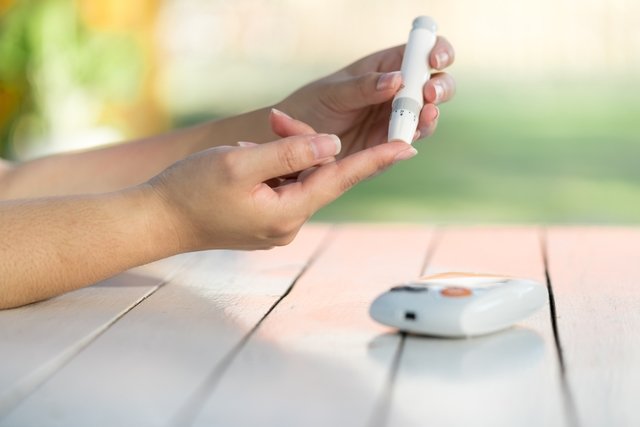Hyperglycemia is when circulating blood sugar levels are greater than 125 mg/dL after fasting for at least 8 hours, or greater than 180 mg/dL 2 hours after eating, which can happen due to insufficient amounts of insulin circulating in the body, as in the case of diabetes, or being a consequence of a sedentary lifestyle, obesity and inadequate diet, for example.
Symptoms of hyperglycemia may appear slowly, such as excessive thirst, headache, increased urination or excessive tiredness, for example, and are more severe when blood sugar levels remain high.
In the presence of symptoms of hyperglycemia, it is important to consult a general practitioner so that the cause can be diagnosed, its cause can be identified and the most appropriate treatment can be initiated, in order to avoid complications such as damage to the eyes, nerves, kidneys, heart and blood vessels.

Symptoms of hyperglycemia
The main symptoms of hyperglycemia are:
- Excessive thirst;
- Constant hunger;
- Frequent urge to urinate;
- Urinate in large quantities;
- Weight loss for no apparent reason;
- Excessive tiredness;
- Somnolence;
- Blurry vision;
- Headache;
- Dry mouth;
- Muscle pain;
- Itching in the genital region;
- Erectile dysfunction in men;
- Frequent vaginal infections in women;
- Tingling sensation in the legs;
- Difficulty healing wounds;
- Difficulty concentrating.
Furthermore, hyperglycemia can cause diabetic ketoacidosis, which is a serious condition characterized by blood sugar levels greater than 300mg/dL and increased blood acidity, making it difficult for the body to perform its functions, and which can lead to the onset of other symptoms, such as nausea, vomiting, breath with a smell similar to rotten apples, abdominal pain, shallow and rapid breathing, mental confusion or coma. Understand better what diabetic ketoacidosis is and how it is treated.
If symptoms of hyperglycemia appear, you should consult your doctor so that diagnostic tests can be carried out and the most appropriate treatment can be started.
How to confirm the diagnosis
The diagnosis of hyperglycemia is made by a general practitioner or endocrinologist through the assessment of symptoms and blood tests, such as a fasting blood glucose test, a glucose tolerance test (OGTT) and a glycated hemoglobin test, to analyze the amount of sugar in the blood. .
In addition, the doctor may order other tests, such as a complete blood count, blood electrolyte levels, such as blood urea nitrogen and creatinine, in addition to a urinalysis, to assess the presence of glucose and ketones in the urine.
Measuring blood sugar levels can also be carried out at home, using a glucometer, which allows you to monitor blood glucose levels, especially for people who have a confirmed diagnosis of hyperglycemia. Learn how to use the glucometer correctly.
Online blood glucose test
To find out the chance of having hyperglycemia, select the test performed and enter your result:
Possible causes
Hyperglycemia is caused by insufficient production of insulin by the pancreas, which is the hormone related to glycemia control, decreased use of circulating sugars by cells and increased glucose production.
Some factors may contribute to the development of hyperglycemia and include:
- type 1 diabetesin which there is a complete deficiency in the production of insulin by the pancreas;
- type 2 diabetesin which the insulin produced cannot be used correctly by the body;
- Gestational diabetesin which insulin resistance occurs;
- Destruction of pancreas cellscaused by diseases such as pancreatitis, hemochromatosis, cystic fibrosis or pancreatic cancer;
- Endocrine disorderssuch as Cushing’s syndrome, pheochromocytoma, or acromegaly;
- Gynecological disorderssuch as polycystic ovary syndrome;
- High cholesterol and/or high blood pressure;
- Stressin which there is an increase in cortisol production, resulting in an increase in insulin resistance;
- Obesitysedentary lifestyle and inadequate diet;
- Use of medicinessuch as corticosteroids, phenytoin or estrogens.
Furthermore, in people who have confirmed diabetes, hyperglycemia can occur due to the administration of the wrong dose of insulin or oral antidiabetics, or even due to an error in the administration of insulin. Learn how to apply insulin correctly.
How the treatment is carried out
The treatment of hyperglycemia should be guided by a general practitioner or endocrinologist with the aim of reducing and normalizing blood sugar levels, relieving symptoms and avoiding long-term complications.
Thus, the doctor may recommend the use of oral antidiabetic medication, such as metformin, glibenclamide or glimepiride, especially for the treatment of type 2 diabetes, or insulin injection, for type 1 diabetes. In some cases, the doctor may recommend the use of insulin together with other oral antidiabetics.
In addition, the doctor should recommend changes in lifestyle habits, such as eating a balanced diet to help control blood sugar levels, and practicing physical exercise, as they help to improve the action of insulin in the body.
Possible complications
Hyperglycemia can cause complications when left untreated or when blood sugar levels are not controlled for long periods, and include:
- Cardiovascular diseases, such as ischemic heart disease, stroke or peripheral vascular disease;
- Kidney failure or diabetic nephropathy;
- Damage to the optic nerves, which can lead to diabetic retinopathy;
- Cataract;
- Metabolic syndrome;
- Diabetic ketoacidosis;
- Nerve damage, which can lead to diabetic neuropathy;
Additionally, people with diabetic neuropathy can develop wounds, ulcers and other lesions on their feet that do not hurt, and increase the risk of wound infections, this complication being known as diabetic foot. Understand better what diabetic foot is and how it is treated.
How to prevent
To regulate blood sugar levels and thus control and avoid hyperglycemia, it is important to adopt healthy lifestyle habits and follow your doctor’s instructions, such as:
- Practice physical activity regularlyas this way it is possible to use sugar as a source of energy, avoiding accumulation in the blood;
- Have a healthy and balanced dietguided by a nutritionist, and it is recommended to give preference to whole foods and vegetables and avoiding foods rich in carbohydrates or sugars;
- Maintain ideal weight through exercise and adequate nutrition, as this ensures better insulin activity and prevents the accumulation of sugar in the blood;
- Taking oral antidiabetics or insulin injection, as advised by the doctor;
- Regularly measure blood glucoseas this way it is possible to check the sugar concentration throughout the day and, in this way, assess the need to go to the hospital.
In addition, you must strictly follow medical recommendations, carrying out the tests requested by the doctor, and measuring glucose levels at home, using a glucometer, so that the doctor can evaluate it during the consultation and adapt the treatment, if necessary.

Sign up for our newsletter and stay up to date with exclusive news
that can transform your routine!
Warning: Undefined array key "title" in /home/storelat/public_html/wp-content/plugins/link-whisper-premium/templates/frontend/related-posts.php on line 12
Warning: Undefined array key "title_tag" in /home/storelat/public_html/wp-content/plugins/link-whisper-premium/templates/frontend/related-posts.php on line 13



